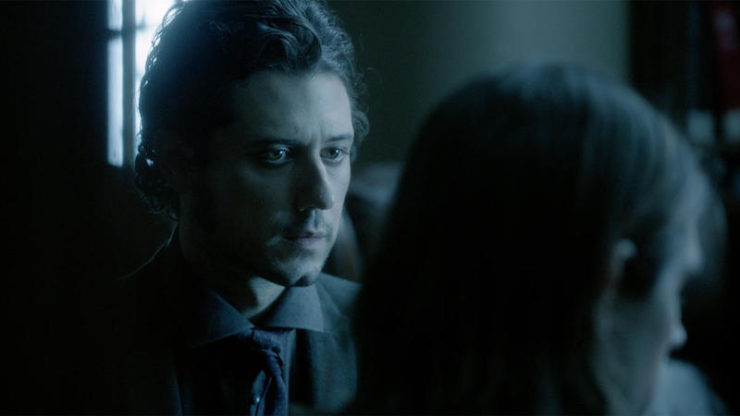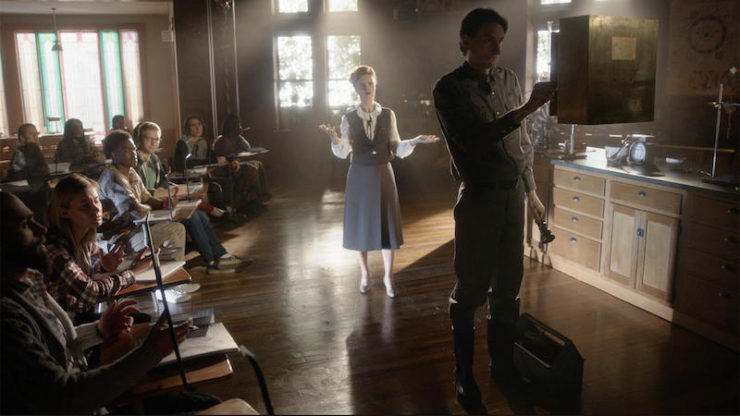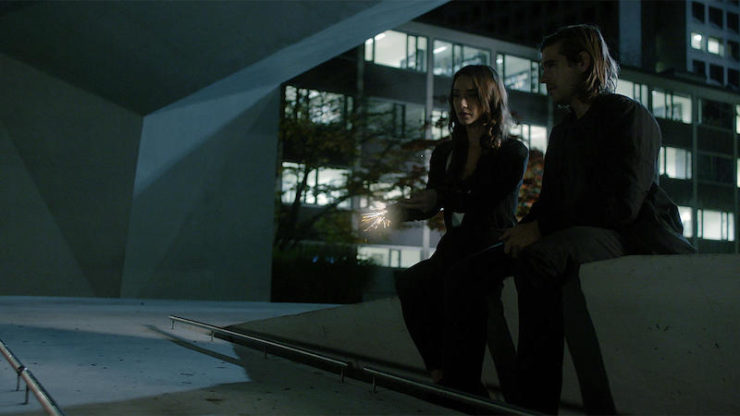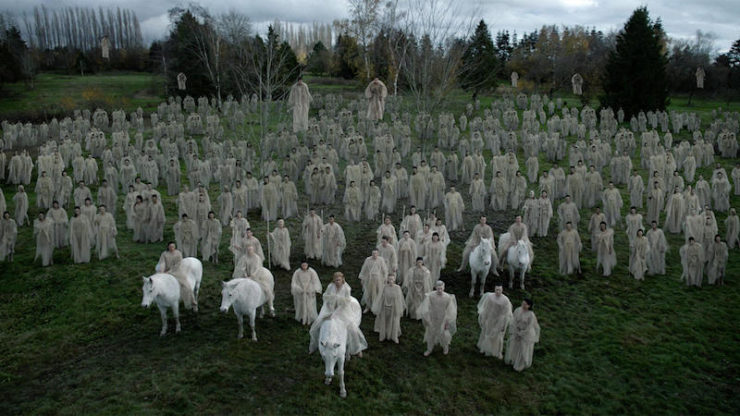What if your whole life was just The Breakfast Club for a chaotically whimsical god?
The Magicians’ second season finale begins with a voiceover summary, a notion that sounds terrible until you discover that the voiceover is from none other than Ember, god of Fillory, who describes everything that’s happened in relation to how much it entertained him. These characters, with all the trials they’ve been through? Just the wacky hijinks of Quentin Coldwater and pals: the addict, the victim, the bitch, the scowl, and the martyr. Just tropes that have ceased to entertain Ember.
Ember, however, knows how to entertain; his version of the story is just as off-color as the real thing, and he does Margo’s voice for good goofy measure. “The danger of sublimated trauma is a major theme in our story,” he notes. “Character is destiny.”
But he also says the candy witch from the season premiere will pay off, and she doesn’t. At least not yet.
How reliable is narrator-Ember? How written is the story in each character’s book, tucked away in the Library? How many choices were made to bring the story to this point? The first season of The Magicians was about growing up, a coming-of-age tale with major trauma, but the second is about something just as difficult, and just as ongoing: surviving.
Ember is wrong about our characters, just as he’s wrong about his brother, and wrong about so many other things. Power, whatever its source, never made anybody any smarter. Eliot may have been an addict, but he’s grown into a leader. Julia was a victim, but she took her fate into her own hands—even if that didn’t play out the way everyone expected. Margo is a bitch, but she’s still trying to save Fen and Eliot’s daughter. Alice was a martyr, but she became a force solely interested in herself. And Penny—forget being a scowl. It’s Penny who says to Kady, after he’s given a diagnosis of just weeks to live, “Let’s not waste time being mad, ok?”

And what is Quentin, the person around who all these character revolve? A sad little nerd king, according to Umber, who’s not wrong. But also a god-killer.
I don’t think even Quentin saw that one coming.
All this change and growth was not obtained easily, and it’s certainly no guarantee of success. Looking back over season two, it’s a season of mistakes, and painful ones—betrayed trust, vindictive aggression, boundless certainty, selfish love. These mistakes are defining, but they’re not limiting. Or they don’t have to be. And sometimes they’re not mistakes, but they feel like the wrong choice anyway. Julia is whole again, her shade returned to her by Our Lady Underground—and she’s exhausted, traumatized, tangled in panic attacks and memories. There is no kinder moment this hour than Eliot, asking if she’s ok, but making a face as he does it: He knows the answer. She’s not. And so he adjusts his request for her help just a little bit, framing it as a challenge, and a way for her not to be alone.
“Why do you care?”
“I just do?”
Caring can’t always be explained, but it’s never a mistake. Eliot will make—has made—his share of fuckups, but more than anyone, he’s accepted them, and the role he has to play. He’s a king. And being a king has taught him the thing everyone has had to come to terms with this season.
“You know what you learn when you’re a high king? Screwing up is inevitable, and there are some fuckups you can never unfuck.”

You can’t unfuck some things. But you can survive them. You can try, and fail, and try again, harder and better and smarter. The problem is that there are gods around, and they have not yet learned to accept their screwups. They would rather smash their toys and go home, building more perfect worlds in tiny linear boxes.
Ember and Umber are like petulant little children, mad that a toy got dirty. Only a new one will do. But humans don’t have that option. We don’t get to throw away a dirty, imperfect life in favor of a new one. And so we learn to survive our mistakes, even when it costs us. Margo’s mistake with Fen and the fairies costs her an eye, a symbolic loss if ever I saw one. She didn’t see what she’d gotten them into, or how fully Eliot was invested in his kinghood, his wife, his family. They have a perfectly them moment of understanding, but the rift between them can’t be ignored.
“I guess we’ll just have to live with this strain until the future reveals itself. Meantime, that future is going to be a big blank post-apocalyptic nada unless we do what we do best.”
“Act out with a total lack of empathy and impulse control?”
“Party like the world depends on it. Because, Bambi One-Eye? It do.”
The strain can’t be ignored, but it can be lived with and worked around. Maybe not if Margo keeps insisting on dominating the populace, but, well, we’ll see what the fairies have to say about that. I never claimed anyone was done learning from their mistakes. Just that they’re learning to live with them.
The biggest mistake, in the end, might be that they thought they were doing the right thing. “Q? I think you just saved the whole world,” Eliot says, when the brother-gods of Fillory lie dead in the castle. And yes, Quentin (and Julia) saved it from the immediate impending apocalypse, the one petty tyrant Ember was about to bring about. But at what cost?
“With every good thing,” Alice says, “no matter how small it is, it’s always married to something so completely disgusting. You can’t escape it.”
This wasn’t a small good thing. This was, in theory, a huge good thing. A save-the-day good thing, hoorah, rainbows and puppies and maybe shiny medals for everyone good thing. Remember last season Quentin Coldwater? All he wanted was Fillory—and Alice Quinn. Now he’s saved them both. So imagine the cold shower that is the news Alice delivers. “Gods like Ember have parents, you idiot.”
And those parents have employees, including the Mario brother of the gods, a plumber who appears to turn off all the sources of magic. The bastard does it with a little smirk on his face.

This could, in different hands, be too much, especially for Quentin—getting all the things he wants, then being the one to fuck it up for everyone. But this was a group effort, a series of choices that led the magical breakfast club to places good and bad. They’ve survived all their mistakes this season, from Penny getting stuck in a magical bank vault to Margo starting a war to Quentin not telling anyone when niffin Alice was in his back. The season built carefully to this point, so that it feels like the natural culmination of everyone thinking the story should go the way they want it to—only to run up against something more powerful that has other ideas. But as Ember’s voiceover shows, they were always up against something more powerful with its own ideas. They just didn’t always know it.
And now, life no longer involves magical choices, but a lot of theory and adjusting. Was it worth it to save Fillory to destroy magic? Should anyone have had the power to make that choice? How does Fillory even work, or exist? What holds a magical world together, if not magic? What about the Neitherlands? And what about these damn fairies, converging on Castle Whitespire? Did their plane vanish?
Still, not even fairies are as interesting as how this season ends: right back at the beginning, with Quentin and Julia, dreaming of magic, trusting only each other. “I have never met anyone less willing to take no for an answer,” Eliot says to Julia early on, and so of course it’s Julia who is still not accepting the universe’s no. She makes sparks.
What will she do with them?

BEST QUOTES AND LOOSE ENDS
- Where are Penny and Kady? Presumably he’s with the rest of the Librarians, but where? How does Kady get to him? Is she not just repeating old mistakes? Last season she passed info from Brakebills to Marina, and now she’s passing things from the Library to Harriet?
- Jason Ralph’s face this episode jumped several magnitudes of expressiveness. When Alice asks, not for the first time, why he brought her back, he’s instantly lost, a child who cannot, will not understand the question.
- “I don’t pretend to understand what you’ve been through but I can tell you, the way you’re relating to that couch is not unknown to me.”
- “It’s a new chapter and the title is, Shit-tons of Drama and Surprise”
- It must drive obsessive Umber insane that his horns are asymmetrical.
- I have many questions about that sword. How did they make it? Did Julia just spell a sword into being god-killing or did she put the bullet in it or what?
- “We are officially a land of godless heathens, making today the first day of our societal adulthood. I for one am slightly terrified and equally excited, and trying not to break into Hamilton.”
- Is the lamprey the thing from the sandbox? It had a family??!?? And what does it mean when Joseph says “my Alice in there still”?
Molly Templeton is hugely relieved that American Gods is about to start, as otherwise 2018 would feel even further away.










